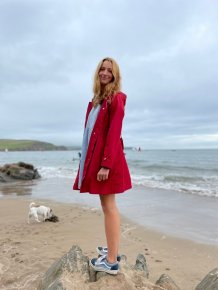Articles

Cristina Corti, Postgraduate Researcher
Cristina Corti - Water They Up To: CWS in the Spotlight
Find out more about Cristina Corti, WISE CDT Postgraduate Researcher in this week's 'Water they up to: CWS in the Spotlight' feature.
What is your research about?
My research is on coastal cliff erosion, focusing on soft, rocky cliffs to understand their erosion mechanisms and drivers. A large component of my project involved developing an automated workflow to quantify retreat rates along sections of coast in England. I am now looking forward to applying this methodology to a number of sites and spending some time modelling the mechanisms driving the retreat.
What is the most exciting part about your research?
Learning in an interdisciplinary environment, which is what the WISE CDT is all about. A component of my PhD involves fieldwork using UAVs (i.e. drones), but I have also been able to develop my coding skills in Python, as well as learning how to manipulate a range of data types.
When thinking about water, what place comes to mind first and why?
It has to be the seaside - I love being by the water, be that a river, lake or beach, but I find that there is something really special about the sea. The sound of the waves crashing on a stormy day, the holiday vibe on a flat sunny day, knowing that it can be a resource (e.g. marine life, carbon sequestration, power generation) as much as a risk (e.g. erosive power during storm events, sea level rise). If I had to choose a specific place it would have to be Bigbury Beach in South Devon - close to home, perfect for surfing with a bit of swell or paddle boarding on a calm summer evening.
Which movie or book character would you most associate with water?
I was going to say 'Finding Nemo', but I am going to go for 'How to Read Water' by Tristan Gooley. Did you know that giraffes are the only mammal that can't swim? As human beings we may not have to live in the water, but most of us will naturally be drawn to it. And some of us will want to gain a scientific understanding of it, for example, about the physical processes driving ocean currents.
Date: 27 September 2021
